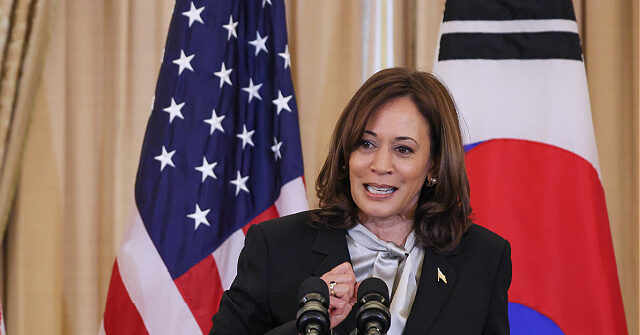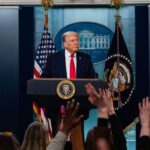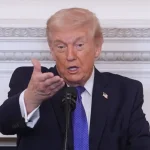
Vice President Kamala Harris published a policy page on her official website Sunday promising she is "ready to be Commander in Chief on day one," but she cited one of her most notorious foreign policy gaffes -- claiming the United States has a "strong alliance" with North Korea -- as evidence.
The post Kamala Policy Page Touts DMZ Visit – Site of ‘Alliance with North Korea’ Gaffe – as Proof She Is ‘Ready’ on ‘Day 1’ appeared first on Breitbart.

Vice President Kamala Harris published a policy page on her official website Sunday promising she is “ready to be Commander in Chief on day one,” but she cited one of her most notorious foreign policy gaffes — claiming the United States has a “strong alliance” with North Korea — as evidence.
Harris’s presidential campaign debuted a slightly more detailed page of her stances on policy issues seven weeks after she replaced outgoing President Joe Biden at the top of the Democratic Party ticket. The page focuses heavily on her experience as a prosecutor and attorney general in California but also features a more limited explanation of her stances on international issues.
“Vice President Harris is ready to be Commander in Chief on day one,” her campaign states. “Vice President Harris has been a tireless and effective diplomat on the world stage.”
A prime example listed on the “issues” page is her visit to the Korean Demilitarized Zone (DMZ) in September 2022 in which she attempted to reassure the nascent government of conservative South Korean President Yoon Suk-yeol of Biden’s commitment to supporting it against the persistent threat of a nuclear North Korea. Biden has not treated the Korean Peninsula as a foreign policy priority during his tenure. During his time in office, communist dictator Kim Jong-un has significantly expanded his influence internationally through broadening alliances with Russia and Iran.
Harris, her policy page states, “has met with China’s Xi Jinping, making clear she will always stand up for American interests in the face of China’s threats, and traveled to the Indo-Pacific four times to advance our economic and security partnerships.”
“She visited the Korean Demilitarized Zone to affirm our unwavering commitment to South Korea in the face of North Korean threats,” it continues, later referring to President Donald Trump as too “dangerous” on foreign policy to return to the White House.
“From advising on tough decisions in the Oval Office and the Situation Room, to serving on the Senate Select Committee on the Intelligence,” the page concludes, “to going after transnational criminal organizations as California’s Attorney General, Vice President Harris brings extensive national security experience.”
The page offers no details on Harris’s visit to the DMZ. Harris visited the inter-Korean border in 2022 and delivered a speech in which her goal was to reiterate how “ironclad” Biden considered Washington’s ties to Seoul. Harris opened the speech, however, by erroneously referring to North Korea as an American partner.
“So, the United States shares a very important relationship, which is an alliance with the Republic of North Korea. And it is an alliance that is strong and enduring,” Harris declared.
[embedded content]
Harris appears to have misspoken, as the “Republic of North Korea” does not exist. The official name of South Korea is the Republic of Korea, while North Korea refers to itself as the “Democratic Republic of Korea.” Later in her remarks, Harris referred to the “Republic of Korea.”
“I cannot state enough that the commitment of the United States to the defense of the Republic of Korea is ironclad and that we will do everything in our power to ensure that it has meaning in every way that the words suggest,” Harris said at the time.
“Our shared goal — the United States and the Republic of Korea — is a complete denuclearization of the Korean Peninsula,” the vice president said. The Democratic Party removed “denuclearizing the Korean peninsula” from its official policy platform in August.
Outside of her DMZ visit, Harris played a minor role in Biden’s Korean policy. Early during his tenure, Biden welcomed then-South Korean President Moon Jae-in to Washington, a trip during which Moon also met with Kamala Harris. The meeting attracted attention in China, where state media claimed that video showed the vice president wiping her hand on her clothes after shaking hands with Moon — allegedly a sign of “disrespect” and “discrimination.”
The relationship with the Yoon administration, compared to Moon’s left-wing government, required more attention. Yoon abandoned Moon’s conciliatory approach towards North Korea but found in the Biden administration diplomats fond of dialogue, a situation that resulted in Yoon openly speculating that Seoul could “possess its own nukes” if it did not feel sufficiently protected by its top ally. Nuclear weapons development in popular in South Korea; a June 2024 poll found 55 percent of South Koreans “support of strongly support” having an independent nuclear weapons program unless North Korea denuclearizes.
Despite her limited, and somewhat embarrassing, Korean policy portfolio, Harris has highlighted it as one of her foreign policy strengths. During her speech at the Democratic National Convention in August, Harris made the unsubstantiated claim that Kim Jong-un was “rooting for Trump” to win the election, promising not to “cozy up to tyrants and dictators.”
In reality, the official flagship propaganda outlet of Kim’s regime, the Korean Central News Agency (KCNA), has repeatedly referred to Trump as a “dotard” and “old lunatic” with a “nasty smell.” Referring to the 2024 presidential election, KCNA announced in July, “we do not care.”




